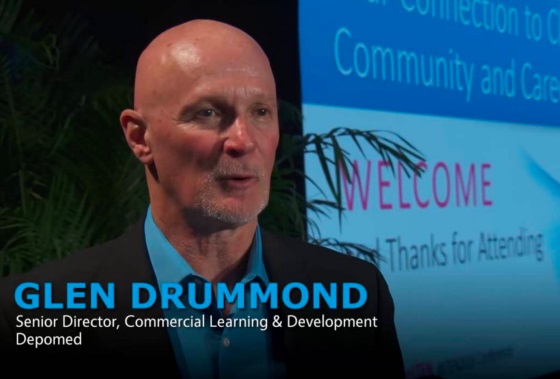
Networking is crucial to business careers and is one of the main benefits of LTEN membership: The chance to meet, connect and learn from your life sciences peers. For this new Bonus Focus feature, we’re happy to introduce you to LTEN member Glen Drummond.
Drummond, the senior director of commercial learning and development for DepoMed, was named one of the 2016 LTEN Members of the Year. He’s been a valuable contributor to LTEN, serving on the Focus Magazine Editorial Board, speaking on LTEN webinars and authoring articles for LTEN publications. This Q&A article will tell you more about Drummond and his life sciences career.
Bonus Focus (BF): What are your main job responsibilities?
Glen Drummond (GD): I’m responsible for the development and execution of the learning and development strategy, as well as providing overall leadership and development of my team.
BF: How long have you been an LTEN member?
GD: I joined when it was SPBT many years ago when I was a regional training manager for Ciba-Geigy (pre Novartis).
BF: What value has LTEN brought to your career?
GD: Besides the networking opportunities as well as benchmarking discussions that can be used for leveraging headcount and resources, the content provided in Focus as well as at the annual LTEN meetings, workshops and channels provides great value for both my team members as well as myself. Predefined tracks really enable a more focused learning and sharing based on the role the person plays in training. My product trainers, my technology coordinator and my director for management development each had their own tracks to follow, which proved very valuable. LTEN also has provided an environment in which to interface with a multitude of vendor partners which enables trainers to do a better job of determining who can help in design and execution.
BF: What is the best career advice you received?
GD: Traditional career laddering usually required a structured stair-stepped approach to move up in the organization. That meant you successfully moved from one job to the next to finally get to the ultimate goal. To be a regional director (RD), I had many required position steps to successfully achieve such as from rep to marketing to district manager (DM) to regional trainer to account management and eventually an RD.
Today, we see career planning more focused around experiences that can be acquired through projects, courses, rotations, short term assignments and, of course, specific job opportunities where you can gain those needed experiences and skills. It is less structured today as I see many different roads to get to a director or VP level. Learning & development can actually play a significant role in helping those in the commercial organization achieve their career aspirations through strong programming and resources, curricula mapping and well-designed development processes, not to mention trainers and training leaders can be great mentors for others moving up the ranks.
BF: What advice would you offer someone seeking a career in training?
GD: I touched training roles several times in my career while striving toward my RD aspirational goal. After achieving that goal of being a successful RD for four years, my next step led me back into to training again, which is where I really solidified my desire to spend the rest of my career in the learning and development space. The reward in training is tremendous due to being a part of someone’s growth and development. I find that incredibly enriching. Developing pathways such as a leadership development process or a levels program then takes on yet another level of reward when you see promotions from processes your built. There hasn’t been any greater reward for me in any other role than being a training leader.
From a career planning perspective, training has always been a cornerstone for career development for reps that want to move into management. Specifically, for my team, our product training roles have been a feeder pool for future marketing and sales management roles. I have also had DMs come into training to develop into associate director and director-level roles downstream. Training experience and the skills derived can be applied in so many other advanced roles as one pursues their career aspiration.
BF: When you think of great leader you worked with, what made them great?
GD: For me it was all about what I could learn from my management and what they were willing to teach. With all leaders we have strengths and development needs. I learned from all of my leaders on what good should look like, as well as what not to do as a leader. Both examples provide a teaching moment for you as you cultivate your leadership skills. I would submit that we look at our career as a journey and you can learn from everyone that you interface. Each role and each experience becomes a chapter in your career journey. Be open to learn, and don’t forget to enjoy the journey!
Share Your Story
Interested in sharing your story through this Bonus Focus feature? Email LTEN Editorial Director Tim Sosbe at tsosbe@L-TEN.org.








